Introduction
In Nigeria, radiological science plays a crucial role in the healthcare system.
This field encompasses various imaging modalities such as X-rays, CT scans, and MRIs.
It is essential for accurate diagnosis, treatment planning, and monitoring of patients.
Brief Overview of Radiological Science in Nigeria
Radiological science is a rapidly growing field in Nigeria.
There is an increasing demand for qualified professionals in hospitals, diagnostic centers, and research institutions.
Radiographers, radiologists, and radiation therapists are among the key players in this discipline.
Importance of Radiological Science in Healthcare
Radiological science plays a crucial role in the early detection and diagnosis of various medical conditions.
It aids in identifying fractures, tumors, and organ abnormalities.
This field helps healthcare professionals make informed decisions and deliver optimal patient care.
Purpose of the Blog Post
The purpose of this blog post is to explore the diverse career paths available in radiological science in Nigeria.
From entry-level positions to advanced roles, there are numerous opportunities for individuals passionate about using cutting-edge technology to improve healthcare delivery and patient outcomes.
Overview of Radiological Science
Radiological science involves the use of various imaging techniques to diagnose and treat diseases.
Definition of Radiological Science
Radiological science involves the use of various imaging techniques to diagnose and treat diseases.
Different Areas of Specialization within Radiological Science
- Diagnostic Radiography: Involves using x-rays to create images of the body for diagnosis.
- Radiation Therapy: Involves using radiation to treat cancer and other medical conditions.
- Nuclear Medicine: Involves using radioactive substances to diagnose and treat diseases.
- Sonography: Involves using sound waves to create images of organs and tissues in the body.
Types of Equipment Used in Radiological Science
- X-ray Machines: Used to produce images of bones and internal organs.
- CT Scanners: Combines multiple x-ray images to create detailed cross-sectional images.
- MRI Machines: Uses strong magnetic fields and radio waves to produce detailed images.
- Ultrasound Machines: Uses high-frequency sound waves to create images of organs and tissues.
Educational Requirements and Training
Entry requirements for pursuing a career in radiological science.
Aspiring radiological technologists in Nigeria need a minimum of a Bachelor’s degree in Radiological Sciences or related field.
Some institutions may require specific subjects in science at the secondary school level for admission.
Applicants may also need to pass entrance exams or interviews as part of the admission process.
Accredited institutions offering radiological science programs in Nigeria.
In Nigeria, several universities and polytechnics offer accredited programs in Radiological Science.
Some of the institutions renowned for their quality radiological science programs include:
- University of Lagos (UNILAG)
- Ahmadu Bello University (ABU Zaria)
- University of Nigeria, Nsukka (UNN)
- Lagos State University (LASU)
Internship and practical training opportunities.
Students pursuing a career in radiological science in Nigeria are required to undergo practical training.
Internship opportunities are available at hospitals, diagnostic centers, and radiology departments across the country.
These practical experiences help students develop hands-on skills and gain real-world experience in the field.
You Might Also Like: Role of Culture in Nigerian Mental Health Practices
Career Opportunities in Radiological Science
When it comes to career paths in radiological science in Nigeria, there are numerous opportunities available for individuals who are passionate about healthcare and technology.
Radiological science is a crucial field that plays a vital role in diagnosing and treating various medical conditions, making it a rewarding career choice.
- Radiological Technologist
- Radiation Therapist
- Radiology Nurse
- Radiation Safety Officer
- Radiology Administrator
Each of these career paths offers unique challenges and opportunities for growth, allowing individuals to specialize in areas that best suit their skills and interests.
Roles and Responsibilities of a Radiological Scientist in Healthcare Settings
Radiological scientists play a critical role in healthcare settings by performing various imaging procedures to help diagnose and treat patients.
Some of the key responsibilities include:
- Operating imaging equipment such as X-ray machines, CT scanners, and MRI machines
- Positioning patients correctly to obtain accurate images
- Collaborating with radiologists and other healthcare professionals to interpret imaging results
- Maintaining patient records and ensuring patient safety during procedures
Overall, radiological scientists are essential members of the healthcare team, providing valuable insights that help physicians make informed treatment decisions.
Job Prospects and Salary Expectations for Radiological Scientists in Nigeria
In Nigeria, the demand for skilled radiological scientists is on the rise, with job prospects projected to increase in the coming years.
Radiological scientists can find employment in various healthcare settings, including hospitals, diagnostic centers, and research institutions.
Salary expectations for radiological scientists in Nigeria vary depending on factors such as experience, location, and qualifications.
On average, entry-level radiological scientists can expect to earn a competitive salary, with opportunities for salary advancement as they gain more experience and expertise in the field.
Advancement Opportunities Within the Field
Radiological science offers numerous advancement opportunities for professionals looking to further their careers.
Some common paths for career advancement include:
- Pursuing advanced certifications and specializations in areas such as MRI, CT, or nuclear medicine
- Transitioning into leadership roles such as chief radiologic technologist or department manager
- Engaging in research and education to contribute to the field’s knowledge and training future radiological scientists
- Exploring opportunities for international collaborations and professional development to broaden skills and experiences
Radiological science in Nigeria offers a dynamic and fulfilling career path for individuals passionate about making a difference in healthcare through the use of advanced imaging technology.
With continuous advancements in technology and healthcare practices, the field of radiological science is poised for growth.
This provides exciting opportunities for professionals to excel and contribute to improving patient care outcomes in Nigeria.
Transform Your Career with Expert Guidance
Get personalized mentorship consulting that’s tailored to your unique path. Our expert advice is actionable and exclusive.
Get StartedGain More Insights: Key Haematology Labs and Services in Nigeria
Challenges and Obstacles in the Field
- Lack of proper equipment and infrastructure in some healthcare institutions
- Radiation safety concerns for radiological scientists
- Regulatory challenges in the radiological science sector
One of the major challenges faced by radiological scientists in Nigeria is the lack of proper equipment and infrastructure in some healthcare institutions.
This can greatly impact the quality of diagnostic imaging and treatment that can be provided to patients.
Without access to state-of-the-art equipment, radiological scientists may struggle to accurately diagnose conditions and administer effective treatment.
In addition, radiation safety concerns are a significant obstacle for radiological scientists.
Working with ionizing radiation poses health risks, and it is essential for these professionals to adhere to strict safety protocols to minimize exposure.
Inadequate training, lack of proper safety measures, or malfunctioning equipment can all contribute to increased radiation exposure, putting the health of radiological scientists at risk.
Furthermore, regulatory challenges present hurdles in the radiological science sector in Nigeria.
Inconsistent policies, outdated regulations, and bureaucratic red tape can impede the efficient operation of radiology departments.
Compliance with regulatory standards is essential to ensure the safety of patients and staff, but navigating complex regulatory frameworks can be a daunting task for healthcare institutions and radiological scientists.
Addressing these challenges and obstacles is crucial to ensure the continued growth and advancement of radiological science in Nigeria.
Proper investment in equipment and infrastructure, rigorous adherence to radiation safety protocols, and streamlined regulatory processes are key areas that need to be prioritized.
These priorities will support the work of radiological scientists and enhance the quality of healthcare services in the country.
Uncover the Details: Training Programs for Obstetricians in Nigeria

Professional Development and Continuing Education
Importance of staying updated with advancements in radiological science:
Radiological science is a field that is constantly evolving with new technologies and techniques.
Staying updated allows radiological scientists to provide the best possible care to patients.
Advancements in radiological science can lead to more accurate diagnoses and treatment plans.
Continuing education opportunities for radiological scientists in Nigeria:
Radiological scientists in Nigeria have access to various workshops, conferences, and seminars to stay updated.
Professional organizations like the Radiographers Registration Board of Nigeria (RRBN) offer continuing education programs.
Online courses and webinars are also valuable resources for radiological scientists seeking to expand their knowledge.
Certifications and licenses required for career progression:
In Nigeria, radiological scientists must be registered with the RRBN to practice legally.
Additional certifications, such as the American Registry of Radiologic Technologists (ARRT) certification, can enhance career opportunities.
Continuing education credits are often required to maintain certifications and licenses.
Find Out More: Dental Therapy Professional Associations in Nigeria
Radiological Science Career Opportunities in Nigeria
Recap of key points discussed in the blog post: Radiological science offers diverse career paths in Nigeria, including diagnostic radiography, radiation therapy, and nuclear medicine.
The field is crucial in healthcare for diagnosing and treating illnesses.
Encouragement for those interested in pursuing a career in radiological science: If you have a passion for healthcare and technology, radiological science can be a rewarding career choice.
With the right education and training, you can make a positive impact on patient care.
Future prospects for radiological science in Nigeria: As the healthcare industry continues to grow, the demand for skilled radiological scientists is expected to increase.
This opens up new opportunities for career advancement and specialization in various subfields within radiology.
Additional Resources
Data Science and Medical Image Analysis Training for Improved …
Innovative Strategies for Developing Biomarker-Informed Cancer …




